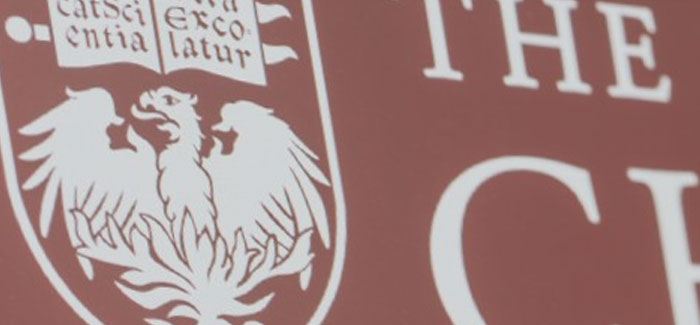
An alumna keeps Benjamin Franklin's legacy alive in 21st-century London.
Commerce and American history have always held an equal appeal for Márcia Balisciano, and she’s pursued her interest in both. After earning a master’s degree from the Committee on International Relations—with a thesis that looked at 19th- and 20th-century Japanese economic and political development—Balisciano, AM’90, went to work for an apparel manufacturing company.
Next stop was the London School of Economics, where she wrote her doctoral dissertation on the “hidden history” of US economic planning from the 1930s to the 1950s. During her last three years of graduate school, Balisciano took a position at the American Chamber of Commerce, where her portfolio included supporting US-UK business partnerships.
Balisciano knew she didn’t want to teach, but she loved the stimulation of studying history. Finishing her doctorate, she wondered, “What am I going to do to replace this part of my life that for the last few years has been about academics?”
The answer came in 1999, when in a Chamber of Commerce meeting Balisciano was asked if she knew anyone who might be interested in taking on a project to restore the former home of Benjamin Franklin, who had lived in London for nearly 16 years on the eve of the Revolutionary War.
“I just knew that was my job,” she says. “And it’s funny, because life comes full circle.” Balisciano grew up in Salem, Massachusetts, where, after a stint delivering newspapers, she served as a teenage tour guide at two historic homes: the Witch House, directly tied to the witch trials of 1692, and the House of Seven Gables, which inspired Nathaniel Hawthorne’s eponymous novel.
Stumbling on the Benjamin Franklin House project “was like finding a needle in a haystack. Here was a derelict building in the center of London—the only surviving house of Benjamin Franklin in the world.” As director, Balisciano threw herself into overseeing the restoration of the house, designing its public offerings and fundraising to help it open to the public on Franklin’s 300th birthday in 2006.
Franklin lived and worked at the house on Craven Street, a short distance from Trafalgar Square, between 1757 and 1775. (He returned to America briefly from 1762 to 1764.) As the colonies’ agent in Britain, he divided his time between diplomacy, scientific experiments, music, socializing, writing, and inventing. During this period he also made the transition “from being a loyal servant of the king to an ardent patriot,” says Balisciano. “That happened on this side of the Atlantic, and it had a tremendous impact on the underlying ethos of what became the United States.”
Balisciano is passionate about Benjamin Franklin House and has raised more than $6 million to support its restoration, educational and outreach programs, and endowment. Still, she admits, “I find it difficult to get all of my satisfaction in one area.” After leaving her job at the Chamber of Commerce, in 2002 she went on to serve as director of corporate responsibility at Reed Elsevier, a global publisher and information provider. “I look at how we can improve our nonfinancial position as a company, alongside our financial performance,” she says. That involves helping Reed Elsevier set and abide by ethical standards, including in its supply chain; consider environmental impacts; and support projects in the communities where the company does business.
Working simultaneously for a large multinational firm and a small cultural institution gives Balisciano a dual perspective and what she calls “a rich diversity of responsibility.” She balances the two roles with help from “two fantastic teams” at Reed Elsevier and Benjamin Franklin House. She says, “Each day calls for prioritizing and tackling the most important issues.”
Balisciano completed her AM in a single academic year at Chicago, but she maintains and values ties with the University. Back in 1999, she met John Studzinski, MBA’80, a senior managing director and global head of Blackstone Advisory Partners, at a UChicago London alumni event. Active in both business and philanthropic circles, he began advising Balisciano in her early years at Benjamin Franklin House and now chairs its board of governors. Three College students have also worked at the house as Metcalf interns.
Looking ahead, Balisciano plans to continue pursuing both her corporate and nonprofit work. “I don’t think that even with one job, a person gets everything done that they wish to in a day,” she says. But a favorite quote from Franklin’s Autobiography reveals her determination to try: “Resolve to perform what you ought. Perform without fail what you resolve.”
